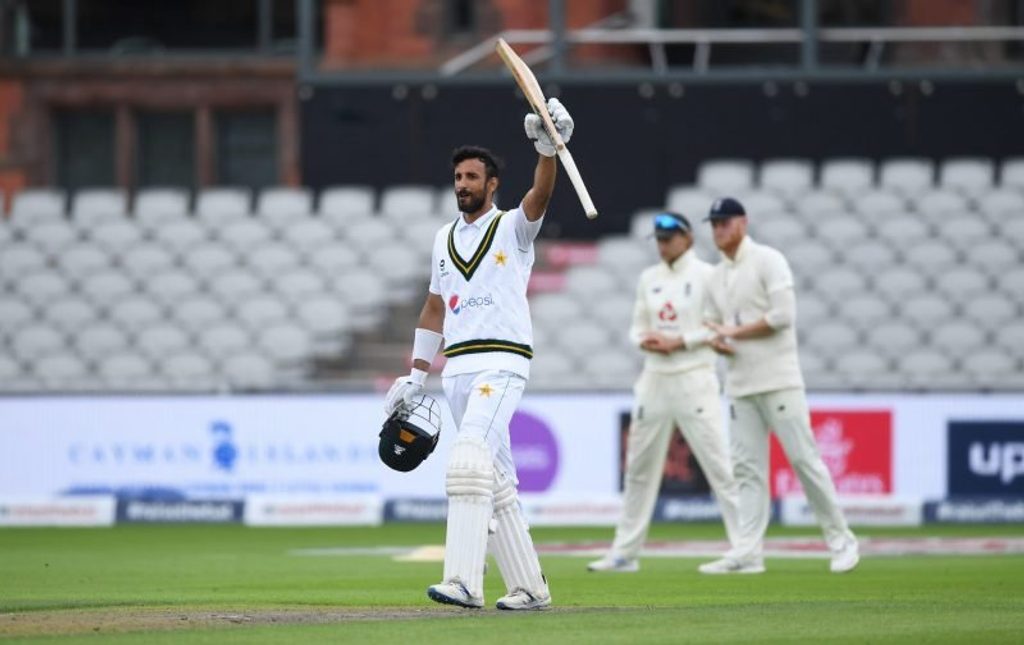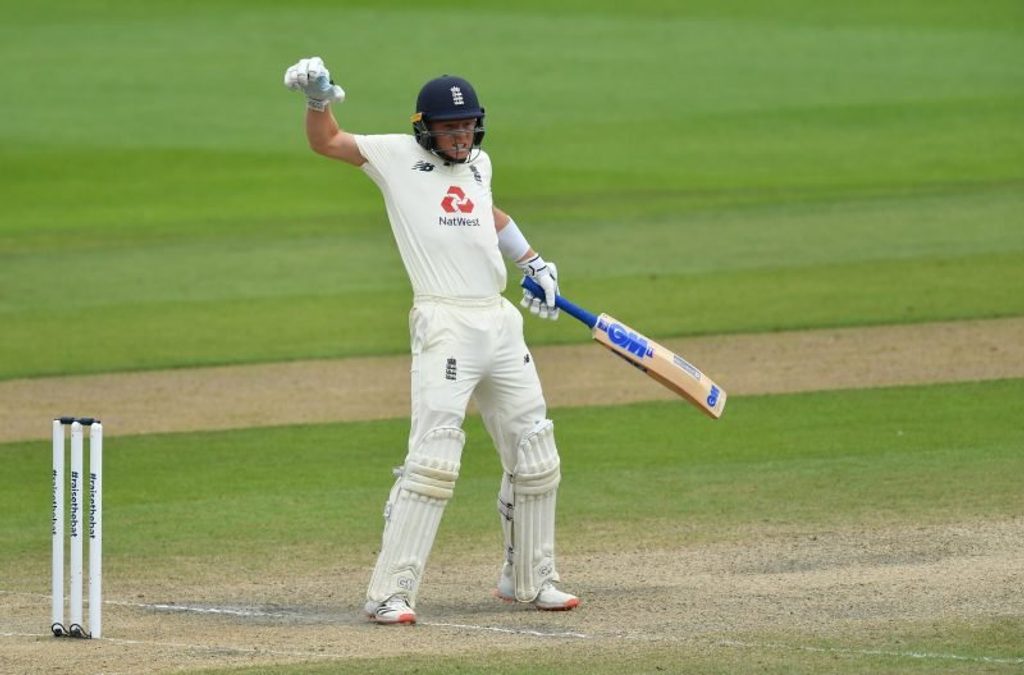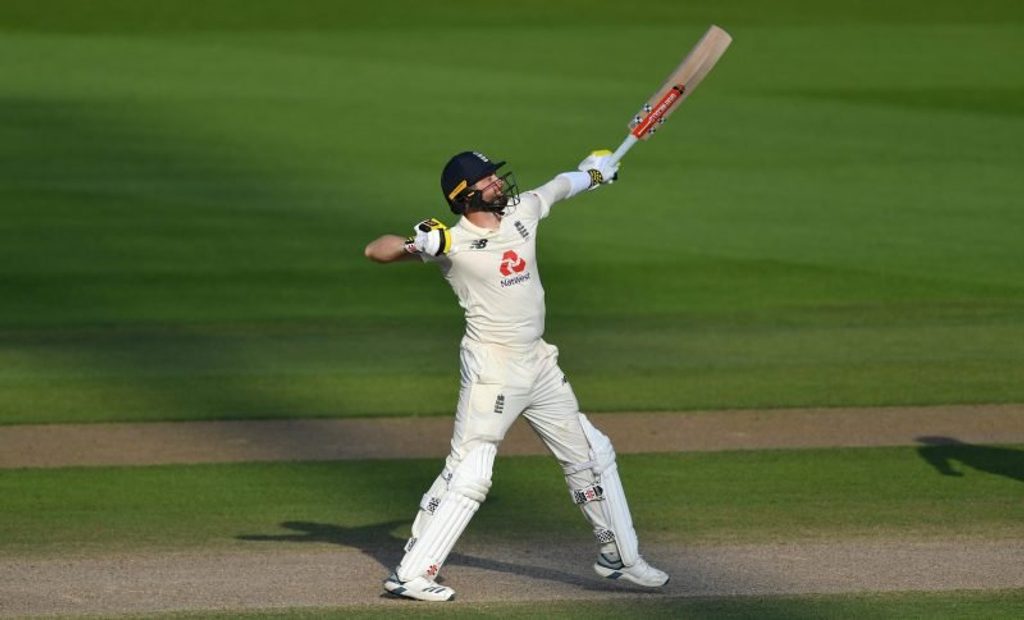
Ben Gardner tells the tale of England’s four-day classic against Pakistan at Emirates Old Trafford.
It’s lunch on day one, and England are already well on top. The four horsemen are dovetailing beautifully, Pakistan are two down, and Shan Masood, having battled through perhaps the toughest two hours of his Test career, has only laid the platform for the strike-rate criticism to come. But that first session is one of the last England will win in a game dominated by Pakistan, and yet it’s a game which will be won by England in the glow late on day four. This is the story of the Miracle of Manchester.
Soon after that first interval, the tide begins to turn. James Anderson bowls two clip balls which Babar Azam dispatches with ease, and the rest of England’s attack begins to follow suit. Between lunch and the day’s second rain delay, Pakistan notch 68 runs in 17 overs. Nasser Hussain calls England’s efforts “absolutely pants”. What follows the resumption is worse still, with Joe Root choosing to bowl in tandem with Dom Bess in the gloom rather than concede the light and return with those quicks in the morning. 17 runs are leaked. Pakistan reach stumps 139-2.
Considering that England’s bowling attack is among the best they’ve ever fielded, the day has gone about as well as it could have for the tourists, but that evening Masood cops that scoring rate flak, from people who you would think had not only not watched Dom Sibley bat against West Indies but never seen Test cricket played anywhere, and Misbah-ul-Haq deflects blows after asking former captain Sarfaraz Ahmed to carry drinks. Such is life in the world of Pakistan cricket.
There, no emotion is ever loosely carried, and the corollary to the criticism is that those who shine can quickly win the adoration of a nation. After his dancing, dashing half-century, Babar’s ascension to the Big Five is complete. Masood, you fancy, patiently digging in at the other end, doesn’t mind ducking the limelight. His eight previous innings against England have brought six dismissals by Anderson and an average of 16.12. He’d take survival and allowing the rest to bat around him.
But when the crown prince nicks off without adding to his overnight total and Asad Shafiq and Mohammad Rizwan fall soon after, all of a sudden Pakistan’s hopes live or die with Masood. All he’ll have for company is Shadab Khan – the most debated of Pakistan’s selections – and four blokes who average 13, 7, 5 and 4.
[caption id=”attachment_170358″ align=”alignnone” width=”800″] The first two days belongs to Shan Masood, but the game goes to England[/caption]
The first two days belongs to Shan Masood, but the game goes to England[/caption]
But Masood has already done the hard work, not just in this Test, but years ago in the nets with Gary Palmer, paving the way for an already fruitful Test comeback, and in the company of the irrepressible Shadab, he starts to open his shoulders. His first half-century takes 156 balls, his next 95, and his last just 60. By the end he’s showing off the range that he’d kept hidden before, slog-sweeping and lofting Dom Bess for a pair of sixes. He leaves with 152 runs to his name – more than in those previous four Tests againt England combined – having buried his demons and with his innings firmly ensconced in the pantheon of great English tone-setters. But, while it’s unquestionably Masood’s day, this won’t be Masood’s match.
***
Soon enough, England are in tatters. Pakistan’s much-hyped attack is almost cartoonishly aggressive: There’s Shaheen Shah Afridi, the 20-year-old spearhead, left-arm, tall and rapid, Naseem Shah, a 17-year-old who’s quicker still, Mohammad Abbas, the wizened medium pacer who targets the stumps basically every ball, and TWO leg-spinners, one with a ripping leg-break and the other a wicked googly. The top-order can’t cope, not even Ben Stokes, who is bowled by a delivery that would be the ball of any other Test match, a 78mph jaffa that seams past an advancing block and pickpockets the bails. Stokes holds the pose, as all the best do when beaten by one just too good.
In Pakistan’s way is Ollie Pope, who does his best Babar impression, and Jos Buttler, who by now is playing for his place and knows it. On a pitch that has turned more than perhaps any he has kept on since he was handed back the gloves, he’d already shelled a succession of chances off Dom Bess, including two when Masood is 45.
Against the quicks, he’s unmoveable, and just as Masood did on day one, navigates perhaps the most testing session of his career to kick off day three. Then Yasir Shah doesn’t turn one, and Buttler is bowled through the gate. He’s faced 108 balls – fewer than he’ll face in the second innings, but we’ll get to that – for 38 runs, batted as well as he has in England whites for a year and a half, and still his Test career is on the line. Pakistan lead by 107 runs.
***
When Pakistan are involved, no game is ever truly lost, but no game is ever truly won either. England do what they have done all year but couldn’t in the first innings, with each bowler relentlessly excellent and even a newly slimline Dom Sibley pulling off a sharp run-out. Ben Stokes, in an otherwise quiet game, prises an opening with two wickets on the third evening. But after Yasir slogs 33, England need 277 to win, more than all but one ever side have ever chased at Old Trafford. The pitch has turned throughout, and, to reiterate, Pakistan have TWO legspinners, two tearaways, and a bowler who could have been designed in a lab for taking advantage of low, uneven bounce.
England, however, don’t seem beaten, and even before Woakes and Buttler join forces, the innings is a minor classic. Rory Burns goes early to a just-out lbw and, after a send-off, responds with a finger on the lips. Whenever Pakistan play, it’s their fans who provide the soundtrack, and even behind closed doors this remains true, with the constant chirping in the field, their vocal reserves from the balcony and a ‘Dil DIl Pakistan’ playing saxophonist parked on a station platform outside the ground making Lancashire feel like Lahore. Maybe Burns knew what was to come, even if his part was done.
[breakout id=”0″][/breakout]
Root plays his second vital innings in a big chase in a year, and for the second time in a year it’s forgotten within hours because of what unfolds elsewhere. Sibley digs in. Even when those two go, there’s still Stokes and there’s still Pope, the miracle man and the miracle boy.
It’s the bounce that gets each, the bounce that should win Pakistan the Test match. Yasir gets one to kick and nick a glove, before Shaheen bowls the ball to bump Abbas into second place, a full delivery that takes a piece of the pitch with it and might have taken Pope’s head, were it not for his gloves getting in a way. England are 117-5, victory a distant 160 runs away. Should five more balls behave even a fifth as viciously, the Test will be Pakistan’s, Root’s winning streak ended, and England’s opening Test hoodoo continued.
[caption id=”attachment_170359″ align=”alignnone” width=”800″] Ollie Pope is dismissed by the ball of the Test match[/caption]
Ollie Pope is dismissed by the ball of the Test match[/caption]
Instead, in a way, it’s that Pope ball that wins England the Test match. Woakes and Buttler take one look, feel they are doomed, and find freedom in the realisation. The only possible hope is to knock off the runs before another one explodes at them, and the pair don’t rest for the entirety of their 139-run partnership. It’s England’s highest for the sixth wicket in a Test chase, but the more remarkable statistic is that not a single maiden is bowled during the pair’s 33-overs-long stand. They accumulate and attack, tickle and tonk, and Pakistan are run ragged.
Azhar Ali realises too late that the game is swiftly slipping away, and the renewed attack comes just too late. Though Yasir gets Buttler and a gloriously promoted Stuart Broad, who for once can’t steal the limelight, Woakes holds firm.
***
The ending isn’t emphatic, but it is fitting, Woakes nicking wide of the slips for the winning runs. Pakistan have been all over England, the moral victories compounding, and the small battles won slowly adding up to the war going their way too. But England have ridden their luck, and just when you expect to see the ball and the game nestle in Pakistan’s hands, you realise it’s at the fence and the chance has gone.
Woakes punches the air before walking off with the look of a man who can’t quite believe what he’s just done, and he’s not the only one surprised. Between this innings and his maiden Test hundred two years hence, he had a high score of 37 and an average of 12.31. Before this game, eight of his last nine innings had ended in single figures. He had looked not just out of form, but nervous facing fast bowling. Now, having been hit on the helmet on the first innings, he’s taken down the quicks.
Mental toughness isn’t the first thing that comes to mind when you think of Woakes, but only because his primary trait has always been niceness. It’s a compliment, until it isn’t, until it’s not just your manner but your bowling, ‘Nice and pretty’ rather than properly threatening.
Arguably, it can lead to him not fighting his own corner enough, a skill that is becoming invaluable in an increasingly competitive England environment. He’s been caught in the crossfire of Broaderson’s battle with the broadsheets, having had little say in the matter himself. Broad said before this summer that Archer is the first name on the team sheet, and he and Anderson agree that both of them should be in England’s best XI. A less agreeable character might wonder where that left him. But Woakes isn’t the type to cause a scene. Instead, he’ll smile and say it’s a good problem to have and praise the other three.
[caption id=”attachment_170354″ align=”alignnone” width=”800″] Chris Woakes punches the air[/caption]
Chris Woakes punches the air[/caption]
But just because the toughness doesn’t reveal itself on the surface doesn’t mean it’s not there. While it’s polite to rise above any potential press pot shots in public, it takes something else to put it to one side internally and bowl as well as you ever have anyway. Woakes has done this before, of course. After six Tests, his bowling average was north of 60, and he’d just been pumped around Centurion by Quinton de Kock. He was left out for England’s first Test of the 2016 summer against Sri Lanka.
Someone with less resolve might consider their chance gone. Instead, he claimed innings figures of 9-36 for Warwickshire, won a recall, and took 11 in the first Test against Pakistan at Lord’s. There were plenty of reasons to doubt Woakes seeing England home, but his mettle was never one of them. This time, England’s nice guy finished first.
***
Because the last word couldn’t go to him on the day, it should go to Jos Buttler here, and while it was Woakes who was Player of the Match, really this was Buttler’s games. His failings and fortunes mirrored England throughout; sloppy in the first innings, struggling with the bat, before finally, incredibly, bouncing back.
After his 75, he admitted that the previous night, with the drops adding up and the runs not compensating, he’d feared for his Test career. His sister revealed on Twitter that that same evening he’d been told his father was in hospital. In a bio-bubble at his adopted home ground, he must nevertheless have felt a galaxy from everything that mattered. He would have been forgiven for looking down at his bat handle, reading the immortal two-syllable missive, and following the instructions to the letter.
[breakout id=”1″][/breakout] Instead, he summoned the best innings of his Test career, with his time in England whites on the line, to not just give his side an unforgettable win, but to remind it’s fans that in Buttler, they have a gem. Test cricket hasn’t yet seen the best of Jos Buttler. And who knows, maybe it never will.
But he’ll always have Manchester. And so will we.








